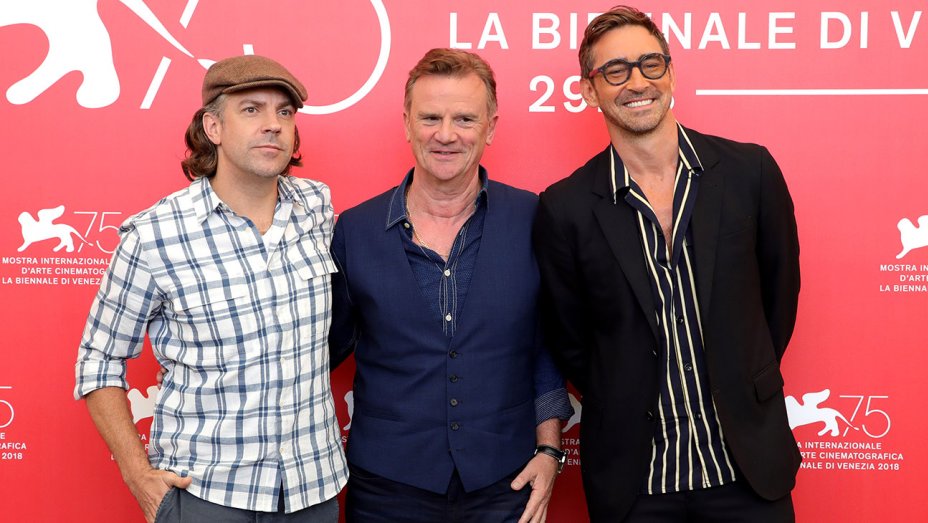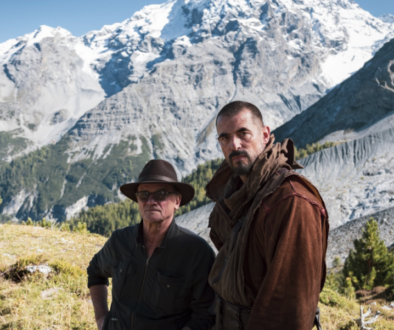10:19 AM PDT 9/10/2018 by Ariston Anderson

Nick Hamm spoke following the Venice Film Festival premiere of ‘Driven’ about the project and the experience of shooting in Puerto Rico following Hurricane Maria.
Nick Hamm premiered his latest film Driven out of competition as the closing night film in Venice before it has its North American premiere in Toronto. And surprisingly his next project will be a TV project inspired by his experiences of seeing firsthand the effects that climate change can have on a nation, after filming in Puerto Rico.
Driven is the 1977-set incredible true story of automobile pioneer John DeLorean (Lee Pace), who dreams of bringing a new type of luxury car to market, a stainless steel car of the future complete with winged doors. His neighbor Jim (Jason Sudeikis), unbeknownst to him and his wife (Judy Greer), is working as an FBI informant for special agent Tisa (Corey Stoll), after getting caught with a planeload of cocaine.
Once it’s clear the car is a failure, DeLorean needs a quick influx of cash in order to keep his company running and he turns to his neighbor for help. Jim sees an easy way out of his FBI obligations, and the FBI sees an great opportunity to frame a public figure. The film is an intimate look at American ambition, as well as a quirky 1970s bromance. DeLorean died penniless before his beloved car would gain fame, appearing in Back to the Future.
“It’s his sled. It’s his rosebud, not to spoil Citizen Kane for people,” joked Sudeikis in Venice, speaking of a drawing that inspired DeLorean’s vision for the car. “Hopefully you’ve seen that by now.”
In Venice, a short documentary, The Making of Driven, directed by Ambika Leigh and produced by Lauren Gleason and Stephen Gyllenhaal, screened after the premiere about the harrowing experience behind the film, which was shot in Puerto Rico following Hurricane Maria.
[su_vimeo url=”https://vimeo.com/288219655″]
The crew originally shot for five days, wrapping Stoll’s scenes, who was already booked to play Buzz Aldrin in Damien Chazelle’s First Man. They saw that the hurricane was coming, and everyone was evacuated for insurance purposes.
“When we returned we had no idea of the actual damage, of how much had gone on,” said Hamm. “We were quite scared about going back. There were no heroics about going back,” he added, before saying that returning to the island was a very simple decision.
“There were a lot of people that needed a paycheck, the support and the infrastructure that a movie can give,” he said. “Not a single actor ever said in any way, ‘I’m not going back.’”
While Hamm said the crew was able to bring supplies and funds to the island, the shoot itself was not an easy one. “There is no lighting in the street. There is no electricity in your houses. There is no air conditioning. Your trailer is four miles from the location,” he said.
Showing the behind-the-scenes of Driven was important for Leigh to ensure that “the film industry in Puerto Rico wouldn’t disappear in the aftermath of Maria.”
A key moment in Leigh’s documentary makes note of Trump’s visit to Puerto Rico two weeks after the hurricane hit, when he downplayed the disaster, acknowledging just 16 deaths, compared it to “a real catastrophe, like Katrina,” and praised his administration’s response. The Puerto Rican government has since estimated that more than 1,400 people have died as a result of the hurricane, raising questions about the federal government’s response.
“The Trump thing is an extraordinary moment in history that someone would actually say that in that moment of time and belittle an actual tragedy of that proportion,” said Hamm.
“What this represents, and let us be absolutely clear, this is a documentary that shows how people are dealing with climate change, not that climate change might or might not happen, not that there is some debate about it,” he said. “You have to live under a rock or be completely stupid not to understand what that means.”
“This for us is an important document to show a group of people actually coming through and dealing with the effects of this,” he said. “That hurricane was the size of Germany. It was half the size of Europe. That’s what is going on on our planet. That’s what these people are living with and they’re going to live with it again and again and again, and we’re all going to do that. Ours is just a little tiny story of how we made that movie in those conditions.”
As a result Hamm is now launching a TV series with Leigh, Climate Wars, with the making of Drivenas the subject of the first episode in the show on how people are dealing with the effects of climate change around the world. “We’re quite interested in the idea that it forms part of a series where you’re showing people at work who are dealing with the effects of climate change, but more importantly as a story for Hollywood,” he said.
When our business goes into communities and when it goes into places it provides a structure, it provides money, it endorses people’s lives and work,” said Hamm. “And that’s what Hollywood and moviemaking can do. So it’s a good story about our business.”
Climate Wars is meant to uncover heroes and villains facing global climate change on a local level to reveal how average citizens can take action now. Subjects will span wide-ranging effects of climate change, from floods to droughts to famine to mudslides to political chaos. The show will focus on real world change through audience participation and social media, shot in an investigative style to uncover the humane type of stories that mainstream media have not yet revealed.
Sudeikis and Hamm also spoke about Driven’s statement on America’s drug war policy. “I know that it’s absolutely ludicrous that you’re going to control drugs by making a big hit catch,” said Hamm about the FBI setup on DeLorean. “I know for a fact that the FBI wanted the front cover of Newsweek. They needed that at that time. That ludicrous idea of “war on drugs,” you’re going to do it by taking down a car designer? You think that’s going to effect policy? I think that’s still the way they do it. They need the publicity, the oxygen of that to keep it going.”
“There’s still a ‘war on drugs,’ absolutely going on,” said Sudeikis. “It’s going on with the legalization of marijuana. There are many older, you know my age, older black men in jail, in prison for carrying a joint. And you’ve got a bunch of old, rich, white dudes figuring out how to sell pens that get people high. And those people are still in jail. So that’s one outcome of the ‘war on drugs’ that’s still going on.”
“Then you have people like the Sackler family who invented OxyContin and are now trying to figure out a way to sell an antidote to that addiction,” continued Sudeikis. “As long as the 10-percenters out there can figure out a way to make money on people and their addictions and the holes they’re trying to fill due to a lack of empathy and love, it’ll continue going on. It’s a deeper problem than just the FBI or government could fix unfortunately. They certainly shouldn’t enable the other ones either, I don’t think.”
https://www.hollywoodreporter.com/news/driven-director-launch-climate-wars-tv-series-filming-hurricane-ravaged-puerto-rico-1141650




